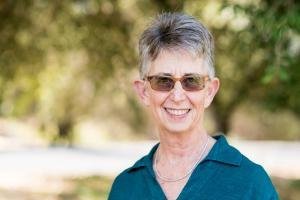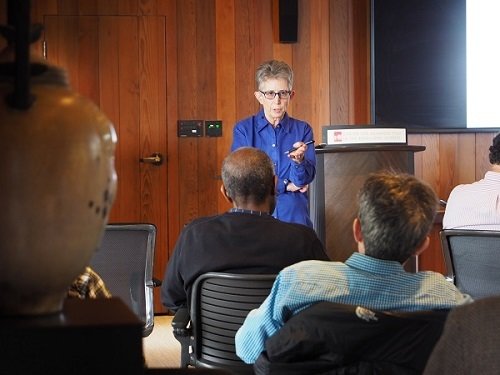
Estelle Freedman, the Edgar E. Robinson Professor in United States History at Stanford University, is one of the history profession’s most accomplished and esteemed scholars, specializing in the history of women and social reform, feminist studies, and the history of sexuality.
In fact, she co-founded Stanford’s Feminist, Gender, and Sexuality Studies program. Over her distinguished career, Freedman has earned a long list of awards and honors for teaching, research, and publishing. Three of those awards, all in 2014, were for her landmark book Redefining Rape: Sexual Violence in the Era of Suffrage and Segregation (2013), nine chapters of which she drafted as a CASBS fellow during the 2009-10 academic year.
During the 2018-19 year, Estelle returned for a second CASBS fellowship, this time with an agenda that did not include writing a book. As the year concluded, we caught up with her to ask about her activities while here on the hill, and whether her CASBS experience from a decade ago gave her a different perspective as a two-timer.
CASBS: This was your second CASBS fellowship. Was your first fellowship experience instructive or helpful as you approached it this time around?
Estelle Freedman: During my first fellowship year, in 2009-10, I concentrated on drafting chapters for a book I had been working on for years. Aside from writing, I wallowed in the expansive time available to indulge in new research, taking the book in directions I had not intended. I completed most of the draft of Redefining Rape Sexual Violence in the Era of Suffrage and Segregation that year. When I applied to return to CASBS, however, I knew I wanted a different experience. For one, I was at the beginning of a new research project, not yet writing. Further, I wanted to take the idea of a sabbatical seriously -- to spend my time reading and thinking broadly about a new approach to the history of sexual violence.
I returned as part of a group on “interdisciplinary perspectives on sexual violence” and that shaped my year. Psychologist Jennifer Freyd, who I had met a few years earlier at a sexual violence conference at Stanford, invited me to apply as a returning fellow to bring historical perspectives to this small scholarly group. I met regularly during this past year with Jennifer, sociologist Elizabeth Armstrong, and political scientist Vanessa Tyson – all 2018-19 CASBS fellows. Reading the scholarship of these “Sisters in Sexual Violence Research” greatly enhanced my interdisciplinary literacy on sexual violence research.
C: Right – and as a CASBS faculty fellow in 2019-20 you’ll remain connected with this group and its work. Needless to say, this would appear to be a critical moment for such work and a group like this one.
EF: Yes. And given the explosion of cultural and political attention to sexual violence, over the course of the 2018-19 year we became as much a support group as a study group! We watched the [Brett] Kavanaugh [U.S. Supreme Court] confirmation hearings together, for example, providing running interdisciplinary commentary. In addition to our own group discussions, during the year we invited other fellows to join us to listen to and meet with speakers we brought to CASBS – to discuss, for example, the feminist politics of sexuality (with former CASBS fellow Gayle Rubin), recommendations for revising sexual harassment policies in the sciences (with the authors of a recent National Academy of Sciences, Engineering, and Medicine report), sexual assault prevention research (by Stanford Medical School scholars), and accounts of both “institutional betrayal” and “institutional courage” in the U.S. and Australia.
C: This collaboration with other CASBS fellows is in addition to the new project with your own research group that you arrived with. What is it?
EF: The research project I began working on just before I returned to CASBS developed in 2018 in ways anticipated and unanticipated. I knew that I wanted to move beyond the legal and media sources that dominated much of the history of sexual violence, my own work included. I wondered about the usefulness of women’s oral histories to locate personal accounts of past abuse, assault, and harassment. Since the 1960s, oral history projects have recorded thousands of interviews with American women but only in the past decade libraries have been digitizing the transcripts. No one has mined these sources through digital humanities methods. Last summer I began a pilot project to do so, along with Stanford University oral history manager Natalie Marine-Street and digital humanities specialist Katie McDonough. We obtained transcripts from collections in several university archives and our preliminary analysis located sufficient evidence to warrant expanding the project. In fall 2018 we presented our first conference paper, on historical constructions of sexual harassment, and a number archivists offered access to more oral history collections. By the spring, our Oral History Text Analysis Project (OHTAP) had processed over 2500 transcripts from ten institutions. We then received a grant from The History Makers, an extensive African American oral history archive, to incorporate their interviews into our corpus. The pilot project has grown far beyond my initial expectations. This summer we began analyzing data and refining a new digital search tool that will become available to other scholars interested in mining oral history transcripts for any research topic. My next steps include drafting articles based on our quantitative and qualitative analyses.

C: You unveiled the project at your CASBS fellows seminar. What do you remember about it and what kind of feedback did you get from the other fellows?
EF: Our research team met at CASBS several times to refine its methods (and to introduce me to qualitative encoding). But presenting my research seminar midway through the year provided a wonderful opportunity to think through how to frame this research project for an interdisciplinary group of scholars. I wanted to emphasize the importance of historical methods for understanding contemporary response to sexual violence. Would speech, or silence, dominate the historical interviews? What different terms, attitudes, and responses would emerge across time and across social groups? Methodologically, I posed the problem of how we can locate speech instances concerning sexual violence when we don’t know the language used at the time. For example, how did women speak about what we now call sexual harassment before that term existed? My colleagues offered intriguing suggestions for euphemisms and slang we might pursue (some of them now appear in our search terms). They also directed me to media events and theories of convening function, recommended predictive modelling, and mentioned additional oral history collections. I’m still following up on all the great feedback!
C: And so back to your overall sense of the CASBS fellowship experience. Was it pretty much unchanged from 2009-10, or do any differences jump out at you?
EF: My fellowship experience did change from the first time I was here, largely by choice, since I wanted to get to know my colleagues better and not just blissfully hole-up in my office trying to write, as I mostly did the first time. From day one [CASBS director] Margaret Levi encouraged the fellows to spend more time with each other and let go of our writing goals. I definitely met the challenge of not writing a book! Along with the sexual violence group meetings I participated whenever possible in the racial equity reading group organized by [CASBS fellow] Kirsten Wysen and the book club organized by [CASBS fellow] Dan Kelly. Aside from my priorities shifting, the year differed because the class was larger, which meant more research seminars, and we had several clusters of academic interests, including populism, nationalism, democracy, inequality, technology, and the intersections of all of these. With both CASBS fellowships the year went by far too fast but even more so this year – I think we could remain until late July a decade ago but had to depart by late June this time. I feel very fortunate that I’ll be a CASBS faculty fellow in 2019-20 so leaving was slightly less painful, though I do miss the fellows already.
C: We have to mention that at the “graduation” celebration for the 2018-19 fellows class, you displayed noteworthy musical chops, playing guitar and singing folk songs with lyrics you tweaked to fit your take on our political moment. They were recorded, we note, on your phone – your own video/oral history of sorts…
EF: My colleague, CASBS fellow Sherman James, and I practiced a few folk songs that reflect themes of the year, such as race, health, and labor (“John Henry” and “Union Maids”). Happily, the crowd sang along! I do have a rough video and am happy to offer it here for the CASBS archive!
